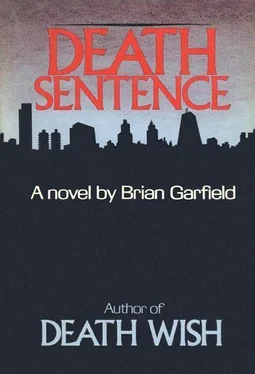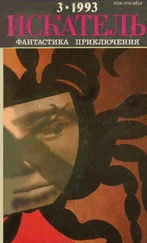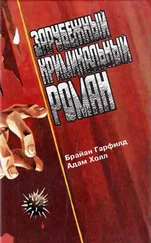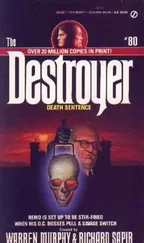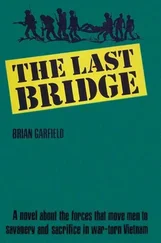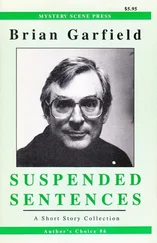Paul said, “Why?”
“Why what?”
“It shouldn’t be like that,” Paul said. “People shouldn’t have to be afraid.”
Ludlow only laughed off-key.
O’Hara said, “Listen, I talked to a guy in Cicero — he’s eighty years old and he’s grateful because it was only the third time his apartment got knocked over.”
“Why does everybody put up with it?”
“We’re all sheep,” O’Hara said. “Sure. Last weekend there was a mugger working the Christmas shoppers down in the Loop. Wearing drag, but it was a guy. Transvestite. He got pissed because a dame refused to hand over her handbag. The guy in drag shot the woman to death in broad daylight right in front of the bus terminal on Randolph.”
“Sweet Jesus.” Paul had the glass in his hand; suddenly it felt cold.
Ludlow sang sotto voce: “Chicago, Chicago, it’s my kind of town,” confusing two songs, possibly deliberately.
Paul said, “The mugger in women’s clothes — was he caught?”
“That one they caught,” O’Hara said: “Of course for every one they nail, there’s a hundred they don’t.”
“You’ll do a fantastic business in this town,” Ludlow told Paul. “Not that it’ll do any good.”
“Why?”
“The police won’t answer the alarms half the time.”
“Apathy,” O’Hara said. “Two guys got hit last night over on Mohawk .38 revolver, four shots fired right on a residential street. Nobody phoned in a report. Everybody who lives on that block must have heard the shots. But it had to wait for some guy driving by to spot the corpses and report it to the cops, and they took their time getting there.”
“You try to walk in this town, you hear footsteps behind you it’s like the sound of grenades. A walk in Chicago after dark is a combat mission.”
“It’s politics, bloody politics.”
“Listen to him. Everything’s politics to the mick.”
“There was a time when the Cook County machine was good for something. You got ripped off, the clubhouse would provide a meal and even a job for you, and a lawyer for the guy who ripped you off. It was all part of the community in those days. Now it’s a political battlefield. The big shots have drawn back, there’s just no contact at all between the politicians and the communities. The machine answers criticism by closing ranks — there are no lines of communication any more. The cops are on the take or they’re not on the take, but either way there’s no old-fashioned dedication there any more. It’s just a job to those guys — you put as little as you can into it, you take as much as you can out of it. If they start busting heads they’re accused of police brutality and if they don’t bust heads they’re accused of corruption — you can’t blame them. The judicial system’s fucked up beyond belief because nobody knows how to treat crime any more. You kill somebody on the street, you cop a plea, the judge lets you off with jail time served and a year’s probation. The rewards for crime keep increasing while the cost of committing crime keeps decreasing. The chances are you won’t get caught, and if you get caught the chances are you won’t get tried, and if you get tried the chances are you won’t get convicted, and if you get convicted the chances are you won’t go to prison. The crooks have got the odds of a thousand to one in their favor. The rest of us are torn between retribution and compassion — we don’t know what we ought to do, so we don’t do anything at all.”
“The people know zip about crime,” Ludlow said.
O’Hara said, “Let’s have another drink. Mr. Mills is buying.”
Before he left them the two journalists had consumed prodigiously and their bickering had lost its amicability: they were threatening each other like blowhards in a Western saloon. The bartender intervened but it only persuaded O’Hara and Ludlow to take the quarrel outside into the night where they started feinting like boxers in the drifting snow.
Paul faded into the darkness. He had never understood men who fought for fun.
He had nursed two beers for hours and come away with valuable items of information and innuendo. He knew something of the organization and disposition of the police — their districts and patterns of patrol, their levels of diligence and indifference. He had gained a rudimentary idea of the organization of the force’s homicide detectives and captains — it was somewhat different from the vertical structure of the New York department — and he’d learned something about the Chicago Crime Commission. He’d been told demographic and commercial facts that didn’t appear on his street maps — Old Town, New Town, the Lithuanian and Polish and Italian and Chinese neighborhoods, the hardcore centers of the four police districts in which nearly half of Chicago’s violent crimes were reported. He’d learned that police surveillance was highest and most efficient in the First Ward — because it was the home ward of the city’s venerable political machine and because it included the showcase Loop — and that it was thinnest in the west and southwest districts.
He’d learned a great many details, some of which might prove inaccurate; nevertheless it had been worthwhile and the two reporters had played nicely into his hands. They’d had to: ask a man to talk about a topic on which he considers himself an expert and he will happily oblige.
He found his way back along Rush Street to the open lot where his car was parked. He ransomed it, declined a receipt and drove south toward the inferior regions of the city.
He was hunting again. At first in New York he’d tried to rationalize it. He’d walk down Riverside Park late at night with his hand on the gun in his coat pocket, and he’d convince himself he was only doing what any peace-loving citizen had a right to do — walk unafraid in a public park. Any predator who might attack him was asking for whatever happened: It’s not my doing, he can leave me alone if he wants to. But he couldn’t delude himself forever. He wasn’t strolling in those parks at two o’clock in the morning for exercise or enjoyment. He was prowling for a kill and any other description of it had to be rationalization. The gun in his pocket wasn’t there for self-protection. He wasn’t defending himself, he was attacking: setting a trap, using himself as the bait and closing the trap when the predator entered it.
He’d asked himself why. He took no pleasure from watching a man die. There was no perverted thrill in it. Inevitably his reaction afterward was painful nausea. He did not feel particularly cleansed or particularly triumphant. Relief, sometimes, that he had come through again without injury; but it wasn’t a challenge that thrilled him, it wasn’t anything he had to prove to himself — it wasn’t macho. He’d spent months thinking of nothing else but there were some things you could analyze to death without ever being able to explain them. It was — what? A sense of obligation? Not a compulsion, not a perverse addiction, no; it wasn’t something he felt compelled to do. It was simply something that ought to be done. A job, a duty uncertainly defined; he couldn’t get closer than that.
When he was deep inside the urban ferment of the South Side ghetto he chose a boulevard lined with shabby stores and drove slowly through the sparse traffic until he saw an open pawn shop. He cruised past it, made the next right turn and had no difficulty finding a place to park; it was not a neighborhood in which you parked your car overnight on the street with any expectation of finding it intact in the morning.
He locked the car carefully and made sure all the windows were shut tight. When he walked back toward the light at the intersection he passed a tall black-bearded man in a wide-brimmed leather hat who moved to the far side of the sidewalk and didn’t look at Paul as they passed each other; the tall man receded into the shadows and Paul turned the corner.
Читать дальше
